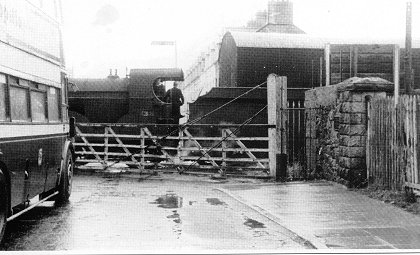When I’d be eariwigging on adult conversation then, I’d hear lots of similar allegations about them ones that ‘made their money’ during the blackout – the local opportunists.
Groceries such as butter, eggs, sugar and tea, and other household goods were a scarce commodity. Still they were obtained, by fair means or foul. Often we went to Omeath on bicycles, or took the Greenore-Omeath train where we’d run the gauntlet of customs men at each terminus. Often enough, more than the odd pound of sugar or half-pound of tea purchased with the last few hard-earned shillings would be confiscated.
At that time Newry had no less than three railway stations. You knew of Edward Street and Dublin Bridge. But at Bridge Street (near to the entrance now of The Quays) we could board the Greenore-Omeath train. These places, with Carlingford and Dundalk beyond, were in the Free State and not subject to war regulations, since the latter was neutral territory. It was wartime and they had shortages too, but compared with us they had ‘lashings and lavings’. They had no need of Ration Books.
Our trips South took place at weekends, when households, fortified with pay-packets from local mills or wherever, were ‘flush’ enough to bear the expense. The wiser or ‘more cute’ members of the family were dispatched to Bridge Street on this precarious errand. They were charged with returning with the items listed above, and maybe a Sunday roast from Omeath. Other items included cigarettes and tobacco, curtain material and perhaps a bottle of spirits.
We had many and devious ways of evading the customs men stationed at both ends of our journey. The Free State customs men weren’t so bad. They’d board the train and stroll along the carriages asking if anyone had ‘anything to declare’. They were from working class homes themselves and knew the score. Needless to say, there wasn’t one of us who had a thing we considered to be contraband!
Six miles up the road and in the other jurisdiction, things were much different. The British Customs were ever ready to pounce on any poor cratur. At about McShane’s Bridge, a mile out of Newry, the nerves would induce stomach cramps in everyone. Happy and confident countenances would take on a worried look.
If George, or Big Dan were on duty that day, things wouldn’t be too bad. We were doomed if that ‘yellow b*****d’ from London was on. A good percentage of the British Customs men were drafted in from England, Scotland or Wales. To us locals they were foreigners.
There was good cause for concern. Many’s the one trudged home in tears having lost everything they had purchased in the Free State. It might have been a winter coat, a huge expense then. Perhaps it was a pretty dress, bought with hard-earned savings.
Salt would be rubbed into the wound when later, a Customs’ man’s wife or daughter would be espied on Hill Street brazenly displaying the self-same dress in public! There was nothing could be done about it!
Our small victories were some recompense. We derived much pleasure from outwitting the Customs men. A favourite ruse was to pack all the contraband in a pillowcase or bolster that was heaved out through the window near McShane’s Bridge to be collected by a waiting accomplice. When the coast was clear it’ll be ferried home by him. Often enough the contraband was waiting for your own arrival home!
Another ruse was the use of a younger member of the family.
Curtain material might be wrapped several times around the previously-slim body. Butter and sugar might be secreted down trousers or knickers and the overweight youngsters pushed in front of the adults exiting the railway station. Eight times out of ten the ruse worked. The other twenty per cent was embarrassing in the extreme.
A child would take stomach cramps at the most inappropriate of times. Or simply have to use the toilet. It would be your turn to pass the Customs post and a packet of sugar would suddenly drop to the ground!
The latter happened to us, but lucky for us, it was George who witnessed it.
The gentleman that he was, he helped us scoop up what was retrievable and instructed us to pass on!
… more …
